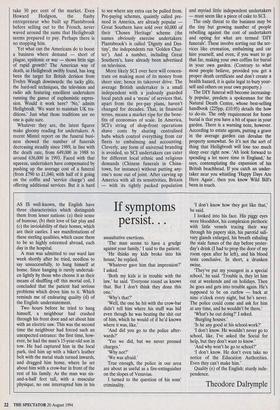If symptoms
persist. .
AS IS well-known, the English have three characteristics which distinguish them from lesser nations: (a) their sense of humour, (b) their love of fair play and (c) the inviolability of their homes, which are their castles. I see manifestations of these sterling qualities, which cause them to be so highly esteemed abroad, each day in the hospital.
A man was admitted to our ward last week shortly after he tried, needless to say unsuccessfully, to hang himself at home. Since hanging is rarely undertak- en lightly by those who choose it as their means of shuffling off this mortal coil, I concluded that the patient had serious problems which drove him to it. Which reminds me of endearing quality (d) of the English: understatement.
Two hours before he tried to hang himself, a neighbour had crashed through his front door and set about him with an electric saw. This was the second time the neighbour had forced such an unexpected entrance: the first time, how- ever, he had the man's 15-year-old son in tow. He had captured him in the local park, tied him up with a biker's leather belt with the metal studs turned inwards, and dragged him home, where he set about him with a crow-bar in front of the rest of his family. As the man was six- and-a-half feet tall, with a muscular physique, no one interrupted him in his assaultative exertions.
`The man seems to have a grudge against your family,' I said to the patient.
`He thinks my kids broke into his house,' he replied.
`Whatever gave him that impression?' I asked.
`Both my kids is in trouble with the law,' he said. 'Everyone round us knows that. But I don't think they done this one.'
`Why's that?'
`Well, the one he hit with the crow-bar didn't tell him where his stuff was hid even though he was beating the shit out of him, which he would of if he'd known where it was, like.'
'And did you go to the police after- wards?'
`Yes we did, but we never pressed charges.'
`Why not?'
`We was afraid.'
True enough, the police in our area are about as useful as a fire-extinguisher on the slopes of Vesuvius.
I turned to the question of his sons' criminality. `I don't know how they got like that,' he said.
I looked into his face. His piggy eyes were bloodshot, his complexion plethoric with little vessels tracing their way through his papery skin, his parotid sali- vary glands enlarged, his breath exhaling the stale fumes of the day before yester- day's drink (I had to prop the door of my room open after he left), and his blood tests conclusive. In short, a drunken swine.
`They've put my youngest in a special school,' he said. 'Trouble is, they let him out at weekends and on holidays. Then he goes and gets into trouble again. He's supposed to be on curfew — back at nine o'clock every night, but he's never. The police could come and ask for him at any time, and he wouldn't be there.'
`What's he out doing?' I asked.
`Burgling houses.'
`Is he any good at his school-work?'
`I don't know. He wouldn't never go to school, like. I've asked the Social for help, but they don't want to know.'
`And why won't he go to school?'
I don't know. He don't even take no notice of the Education Authorities. Even they can't make him.'
Quality (e) of the English: sturdy inde- pendence.
Theodore Dalrymple


















































 Previous page
Previous page